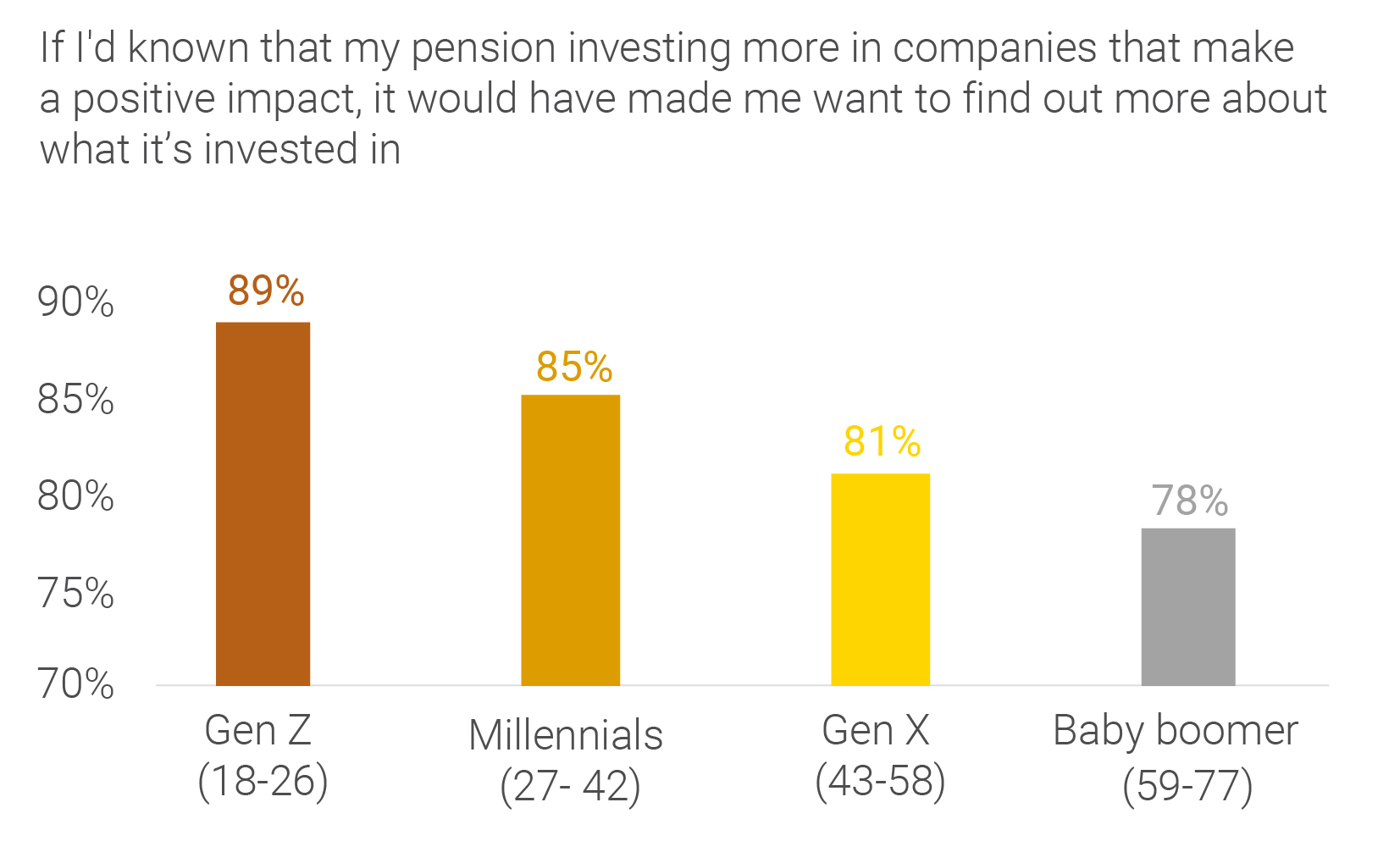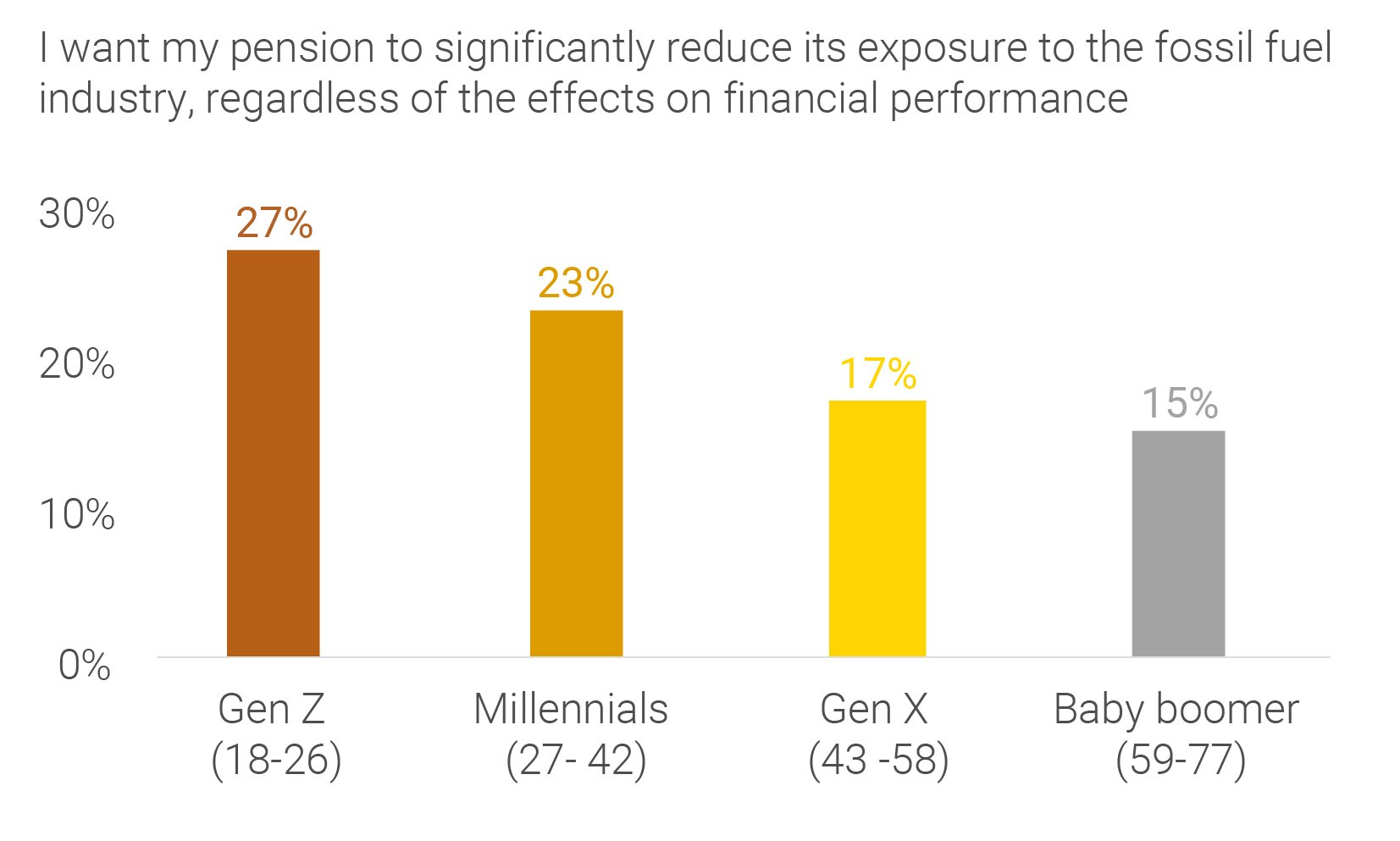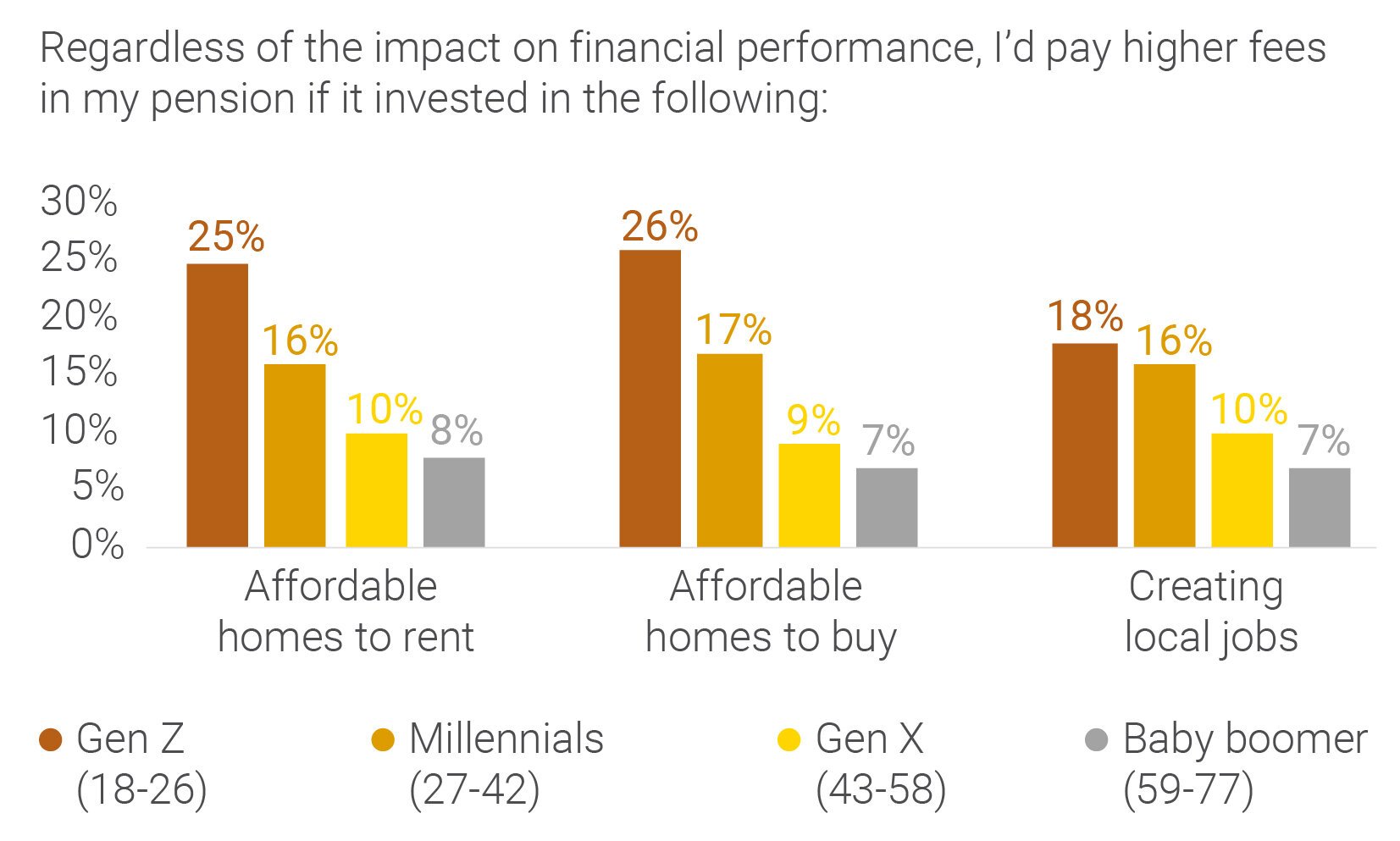By Rita Butler-Jones, Head of DC
It’s nothing new for young generations to want to appear different from their predecessors. But when it comes to Generation Z, they really could claim to be different when it comes to their pensions.
Brought up with sophisticated gaming technology as a mainstream entertainment option and accessing social media as a standard information source and communication channel, this is also the first generation of workers who’ve never known what it’s like to not be automatically enrolled into a pension scheme and who must therefore make a conscious choice to opt out.
These same workers – currently aged between 18 and 26 – have also started their working lives at a time when global phenomena such as the effects of climate change are not the stuff of academic debate on managing distant threats but are manifesting in their lives now.
So, do ‘Gen Zers’ understand the links between their pensions and ESG (environmental, social and governance) issues, and what can the pensions industry learn about their attitudes and motivations? Our latest research1 into the ESG views of our DC pension members attempted to find out.
They have the power – once someone tells them
Despite being automatically enrolled into workplace pension schemes, our Gen Zers aren’t particularly clued up when it comes to the basics of pensions or the power of their pensions as a tool to influence ESG behaviours of companies in which their funds are invested.
We asked our DC members if they were aware that their pensions were invested, that this meant they owned little bits of companies, and that collectively, their pension funds owned large parts of many businesses. Of the 3,634 DC members we interviewed in the UK, across all generations, the total numbers of those who said they were very aware or vaguely aware of this was 68%. As a group, our Gen Zers were slightly less aware than the entire cohort at 65%.
However, once they do know, Gen Zers seem to like the implications this has on the power of their pensions to drive positive ESG changes. Nearly nine in 10 (89%) of these young workers say they would have wanted to be more involved in their pensions and its investments if they’d known it was being used to reward and encourage companies to make a positive ESG impact.

Source: Legal & General Investment Management (LGIM) survey in June 2023 of the views of 3,634 defined contribution workplace pension members in the accumulation phase, on environment, social and governance investing. Respondents were split across generations and genders and across the UK.
Net zero – who cares?
The vast majority of our Gen Zers (83%) have heard of net zero in connection to climate change and more than three-quarters (78%) would be prepared to pay higher pension fees to support it.
In fact, our Generation Z DC members are pretty much sold on the concept that net-zero investments are not just good for supporting efforts to tackle global warming, but that managing the material risks of climate change could also be good news for their long-term financial security.
For example, when we asked all our DC pension members how well they thought pension funds which had net zero targets might do in the long-term, 72% of Gen Zers thought they’d do better than funds without. This was significantly higher than the figure across all generational groups where a much lower 55% thought these funds would do better.
Our youngest generation of pension members are also embracing green finance2 – once they know what it is. While awareness of green finance is generally low among all those we surveyed (around half), once it’s explained to them, Gen Zers are its strongest supporters with 90% saying they’d like to see their pension money used in this way.
What’s on their mind?
While there is little difference between the generations on the ESG issues that most concern them, the voices of Gen Zers tend to more strident when it comes to taking action.
For example, the average across all generations who say they worry a great deal or a fair amount about climate change/global warming is 80%. However, Gen Zers are the least tolerant of the continued use of fossil fuel use with a resounding 93% wanting to see their pension reduce its exposure to investments in fossil fuels.

Source: Legal & General Investment Management (LGIM) survey in June 2023 of the views of 3,634 defined contribution workplace pension members in the accumulation phase, on environment, social and governance investing. Respondents were split across generations and genders and across the UK.
And more than a quarter of Gen Zers (27%) don’t care if this would affect the financial performance of their pensions. Just for comparison, only 15% of Baby Boomers would risk taking a hit on their pension’s performance.
In addition to climate change and in line with the overall results across all of the generations we surveyed, the Gen Zers were mostly concerned about biodiversity loss and river pollution. More than eight in 10 (82%) said they worried either a great deal or a lot about loss of plants and animals while 80% said they were concerned about river pollution.
And our Gen Zers are keen to see action taken on these issues. When we asked our DC members if they’d want to see their pension being used to act against companies which were having a negative impact on biodiversity, 88% of Gen Zers said yes. While this figure isn’t far off the average across all generations, nearly three in 10 (29%) of Gen Zers would like this to happen even if it affected the performance of their pension pot – the highest number of all the generations with Baby Boomers and Generation Xers the most cautious about this with 18% prepared to risk their pension performance.
It was a similar picture in the case of using pension power to tackle bad company practices on water pollution where 28% of Gen Zers said they’d want this to happen regardless of any consequences it might have for financial performance. The figure was the same for Millennials while the other two generations – Generation X and Boomers – each recorded a slightly less enthusiastic 21%.
Divestment or engage?
Most of our DC pension members seem to be shifting position away from wanting to avoid investing in companies exhibiting bad ESG practices in favour of working with them to change their behaviour. The numbers who wish to avoid investing in companies with bad practices is down on last year from 39% in 2022 to 32% in 2023.
However, our Gen Zers take a slightly harder line compared with the general trend. In 2023, 35% of Gen Zers said they’d prefer to avoid rather than engage with these companies, which hasn’t changed from our last survey in 2022.
Our Gen Zers are also keen to see their pension money invested in infrastructure projects that support ESG objectives.
In fact, so keen are they, that most of our youngest generation of DC members would be prepared to pay higher pension fees to support these type of investments despite recording their views at a time of rising prices, and just months after the Office for National Statistics estimated that consumer price inflation was the highest in more than 40 years3.
Almost three-quarters (72%) of our surveyed DC members said they’d pay higher fees to invest in infrastructure that supported renewable energy sources, such as solar parks and wind farms. That figure rose to 83% for Gen Zers.
Perhaps unsurprisingly given their stage of life, our Gen Zers were particularly interested in affordable homes and job creation with this generation reporting higher levels of support than the overall trend across all age groups.

Source: Legal & General Investment Management (LGIM) survey in June 2023 of the views of 3,634 defined contribution workplace pension members in the accumulation phase, on environment, social and governance investing. Respondents were split across generations and genders and across the UK.
We asked if our DC pension members would pay higher pension fees to support funds that invested in the following:
- Affordable homes to rent. 67% of the whole cohort said they would, compared with 80% of Gen Zers
- Affordable homes to buy. 69% of the whole cohort said they would, compared with 84% of Gen Zers
- Creating local jobs. 69% of the whole cohort said they would, compared with 79% of Gen Zers
Finally, if pension providers were in any doubt that the pensioners of tomorrow are committed to seeing their pension funds invested to support ESG initiatives, they might like to see how a provider’s approach to ESG is likely to influence our Gen Zers should they ever consider consolidating with one provider over another.
When we asked our Gen Zers if a provider’s actions on ESG issues would factor into their decision on whether or not to consolidate their pensions with them, more than eight in 10 (83%) said it would, compared with the average across all generations of 75%.
Action stations
While retirement may seem a long way off to our youngest DC pension members, they are plugged in right now to the concept of using pension power to tackle ESG issues.
Given their stage of life and the cost-of-living crisis, perhaps unsurprisingly, those aged between 18 and 26 are keen to see their pensions supporting key areas of infrastructure such as the building of affordable homes and local job creation.
Yet, given recent episodes of soaring temperatures around the world, Gen Zers seem focused on the potential risks of climate change in a way that previous generations either weren’t or felt no urgency to be. This is reflected in their being the generation most strident about avoiding fossil fuels, and most comfortable with risking a dip in their pension’s long-term financial performance to see affirmative action to tackle environmental threats.
We’ve listened to our DC pension members, and they’ve told us clearly that most of them want to have net zero targets in their pensions. But none more so than those of Generation Z, who will be most affected by climate change and are the most prepared to pay more through their pensions for action to help deal with it.
[1] Legal & General Investment Management (LGIM) survey in June 2023 of the views of 4,678 defined contribution workplace pension members on environment, social and governance investing. Respondents were split across generations and genders and across the UK and Ireland. This article refers to UK data only.
[2] Green finance generally refers to loans or investments that promote environmentally positive activities
[3] Office for National Statistics: www.ons.gov.uk/economy/inflationandpriceindices/bulletins/consumerpriceinflation/june2023:“The Consumer Prices Index including owner occupiers' housing costs (CPIH) rose by 7.3% in the 12 months to June 2023, down from 7.9% in May, and down from a recent peak of 9.6% in October 2022. Our Indicative modelled consumer price inflation estimates suggest that the October 2022 rate was the highest in over 40 years…”
Key Risks
Past performance is not a guide to future performance. For professional investors only. The value of investments and the income from them can go down as well as up and you may not get back the amount invested. The details contained here are for information purposes only and do not constitute investment advice or a recommendation or offer to buy or sell any security. The information above is provided on a general basis and does not take into account any individual investor’s circumstances. Any views expressed are those of LGIM as at the date of publication. Not for distribution to any person resident in any jurisdiction where such distribution would be contrary to local law or regulation.
This financial promotion is issued by Legal & General Investment Management Ltd. Registered in England and Wales No. 02091894. Registered office: One Coleman Street, London EC2R 5AA. Authorised and regulated by the Financial Conduct Authority.
Further reading
ESG in DC: UK member research 2023
Despite the cost-of-living crisis, ESG investing remains a priority for most DC members. Our research suggests that many would even be prepared to pay higher fees to see their funds supporting ‘green’ initiatives.





















